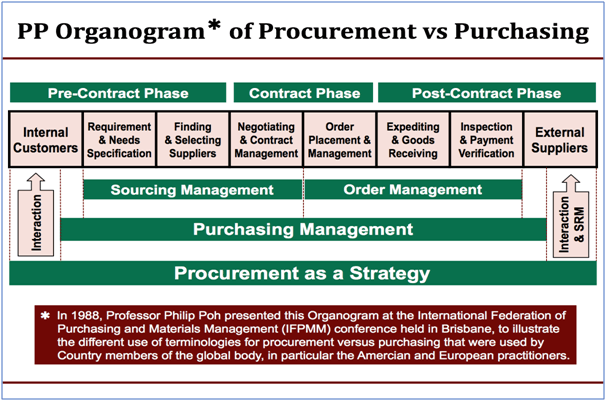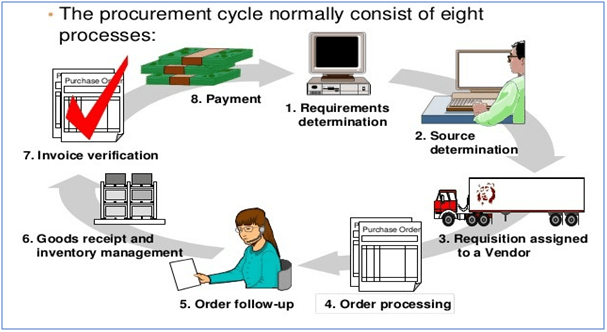Procurement is the process of finding, agreeing terms and acquiring goods, services or works from an external source which ensures that buyer receives goods, services at the best possible price, when aspects such as quality, quantity, time, and location are compared. Procurement includes all purchasing functions that pertain to obtaining goods, works and services including description of requirements, selection, invitation of tenders, preparation and award of contract.
The difference between Procurement and Purchasing can be best illustrated by the organogram, as shown below.

Table of Contents
Managing Procurement Cycle with 5Ps
When it comes to procuring goods and services at the best possible price, in the right quantity and quality, in the right place and from the right source, there are key essential factors that must be put in place to benefit from a good procurement management. And without these key essential factors in place, all your time and effort invested in making sure that every procurement project is a success will be wasted.
The Proposal Factor
The first ‘P’ is the proposal because this is the primary document issued at an early stage of a purchasing process. This document is sent to suppliers inviting them to submit a proposal to provide the goods or services. In order to achieve a successful procurement project, proposal must be issued to ensure that responses from vendors meet the organization’s needs and are structured in a way that allows the organization to easily compare proposals and contract the right vendor.
The diagram below shows a typical Procurement Cycle consisting of 8 processes.

The Planning Factor
The second ‘P’ is planning, which is to guarantee a successful procurement project. Planning is very important because it helps to decide what to buy, when and from what source. Planning also helps to assign procurement method and the expectations for fulfillment of procurement requirements. As the saying goes, “If you fail to plan, you plan to fail.” Careful preparations must be made ahead through effective procurement planning to avoid project failure.
The Pricing Factor
The third ‘P’ is price. Price is very important when it comes to procuring at a valuable cost. It might not be as glamorous as promotion, but it is the most important decision that a procurement personnel has to make. It is especially important because it represents vendors’ assessment of the value customers see in the product or service and are willing to pay for a product or service. Thus, the power and impact of pricing in procurement management cannot be ignored. By considering the value of all purchases, this can assist to gain price concession from the vendor.
The People Factor
The fourth ‘P’ of procurement is people. A team of procurement personnel makes sure that the activities planned are carried out in line with current and existing requirements of the project. It is thus crucial to hire the right people with the right skills because this ensures the success of an effective procurement project.
The Project Management Factor
The fifth ‘P’ is project management. Managing procurement project ensures that purchased items which are selected and acquired according to the specifications and requirements are delivered on time.
Project management is vital in achieving a successful procurement by reduce the chance of a project failing; make things simpler and easier for procurement team with a single point of contact running the overall project. It also encourages consistent communications amongst staff and suppliers and help to keep costs, time frames and resources to budget. In order to achieve the procurement goals of an organisation, it is necessary that these key factors are in place to benefit from an effective procurement management.
Procurement Key Performance Indicators (KPIs)
When measuring the effectiveness of procurement, key performance indicators can be used, and they can be classified under various categories e.g. general procurement measurements, delivery performance, cost measurements etc. This article attempts to highlight six categories of procurement KPIs.
General Procurement KPI Measurements
This category involves the measurement of key purchasing activities and to evaluate the efficiency and effectiveness of the purchasing functions. Some of these measurements include the following:
1. Purchase Dollars as a percent of sales dollars
2. Purchasing Employees as a percent of company employees
3. Sales Dollars per purchasing employee
4. Purchase dollars spent per active supplier
5. Purchase order cycle time (in days)
6. Percent of purchase transactions processed thru e-commerce
7. Percent of services purchases handled by the purchasing department
8. Number of suppliers
Cost Key Performance Indicator
This category involves the spend analysis of incurred in a purchasing transaction and to assess the value obtained in the procurement activity. Some of these measurements include the following:
1. Cost of Purchasing Order
2. Cost Avoidance = Actual Purchasing Price – Lowest Price Quoted
3. Cost Reduction = Actual Purchasing Price – Last Price Paid
4. Procurement ROI = (Cost Reduction + Cost Avoidance)/Cost of Procurement Operation
Quality Key Performance Indicator
This category involves the quality analysis of products purchased and to assess the reliability of products purchased and that of the suppliers. Some of these measurements include the following:
The full content is only visible to SIPMM members
Already a member? Please Login to continue reading.

